The Hunger Games: Mockingjay - Part 1
 for intense sequences of violence and action, some disturbing images and thematic material.
for intense sequences of violence and action, some disturbing images and thematic material.
Reviewed by: David Criswell, Ph.D.
CONTRIBUTOR
| Moral Rating: | Offensive |
| Moviemaking Quality: |
|
| Primary Audience: | Teens Adults |
| Genre: | Sci-Fi Action Adventure Drama Adaptation Sequel |
| Length: | 2 hr. 3 min. |
| Year of Release: | 2014 |
| USA Release: |
November 21, 2014 (wide—4,151 theaters) DVD: March 6, 2015 |
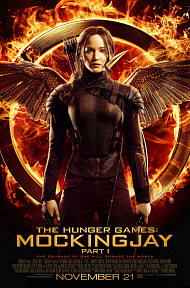

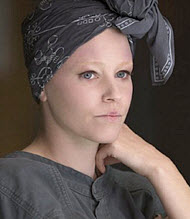
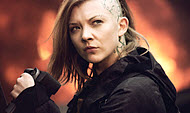
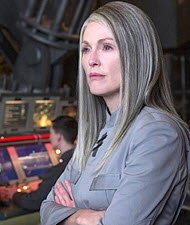
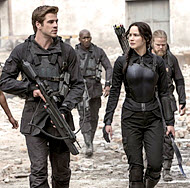
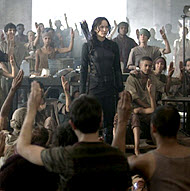
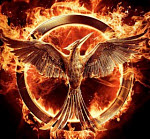
war and its cost—devouring both the unjust and the just
Every human life is valuable. The taking of lives is tragic.
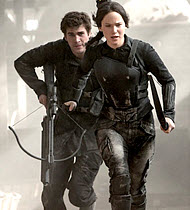
What is the Biblical perspective on war? Answer
the comment that it’s the things we love most that destroy us
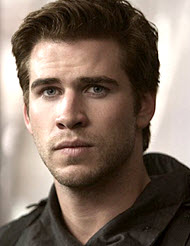
Refuse to give in to evil. Refuse to compromise about what is truly right and good.
RIGHT AND WRONG—Are we living in a moral Stone Age? Answer
bravery / courage / self-sacrifice
Evil governments, and our enemy the Devil, use FEAR to control people. How can we overcome that?
OVERCOMING FEAR—What does the Bible say? Answer
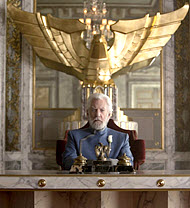
importance of personal freedom
dangers of big government control
What are the mechanics of totalitarian governments?
society in a repressive and controlled state, under the guise of being utopian
compare the film’s live televised spectacles to the ancient Roman Colosseum’s games and events, produced for public entertainment and political control
the trilogy’s coming constant battle for freedom against tyranny
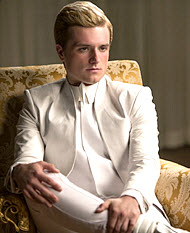
media control and manipulation / What are the ways that media “play” the masses in the favor of those in control?
What is generally wrong with the way celebrity is created in our culture?
Are today’s youth being overexposed to contrived reality on television, leading to a detachment from images of others’ real pain and terror?
“What’s your relationship to reality TV versus your relationship to the news?”
Author Suzanne Collins says, “Too much of people’s lives are put on television, and we’re desensitised to actual tragedy unfolding before us.”
the importance of hope
| Featuring |
|---|
|
Jennifer Lawrence … Katniss Everdeen Josh Hutcherson … Peeta Mellark Liam Hemsworth … Gale Hawthorne Woody Harrelson … Haymitch Abernathy Elizabeth Banks … Effie Trinket Julianne Moore … President Alma Coin Philip Seymour Hoffman … Plutarch Heavensbee Jeffrey Wright … Beetee Stanley Tucci … Caesar Flickerman Donald Sutherland … President Snow Toby Jones … Claudius Templesmith Sam Claflin … Finnick Odair Mahershala Ali … Boggs Jena Malone … Johanna Mason See all » |
| Director |
|
Francis Lawrence |
| Producer |
|
Color Force Lionsgate See all » |
| Distributor |
“The courage of one will change the world”
When the first “…Hunger Games” came out, there was much discussion over its theme of kids killing kids, but when I saw the film I saw it was really about government control and about two simple kids who defy the system by loving one another. The second film went further, showing the fragility of governments which thrive on fear and distraction. The film ended with the beginning of a revolution. Now “Mockingjay Part 1” tells the story of that revolution. There is no “Hunger Games” in “Hunger Games III.”
The story begins immediately after the last film where Katnis Everdeen finds out that Peeta, one of her two possible love interest, is captured by the Capitol. Meanwhile, the rebels enlist Katnis as their symbol for the Revolution. She is to be their “Mockingjay”—a bird which has come to represent rebellion and revolution.
They begin making propaganda films and integrating Katnis into the rebels’ camp, but she continues to demand the rescue of Peeta, who many believe is now a traitor, because he, too, has been making propaganda videos… for the Capitol. Eventually. a rescue operation is undertaken to save Peeta and the other Hunger Games winners who were captured.
One good thing about “Mockingjay” is the simple fact that it is based on a book. Most Hollywood scripts are superficial and lack the depth of novels. “Mockingjay” offers intriguing thoughts on politics, love, propaganda, and the simple humanity of people caught up in history. None of the characters are simple. One of the leaders of the revolution is actually a man who suggested that the Capitol double its executions of rebels.
Likewise, Katnis is a reluctant leader. She never wanted to be a leader, which is what makes her right for the job. This is, also, why the film is believable. Whereas most Hollywood script writers would have made Katnis a tough feminist, Suzanne Collins wrote the story of a family girl who is thrust into history. Katnis only wants to live in peace with her family. She has no desire to prove her superiority to anyone.
One intriguing aspect of the film is the role of propaganda and advertising in modern politics and war. I have seen how the Internet has served to divide people politically, rather than bring us together. The media has massive power to sway the masses. A great deal of the film involves the “moves and countermoves” between the rebels and President Snow (the dictator). Much of this involves the pitting of Peeta against Katnis in video messages broadcast to the residents of Panem.
In terms of family friendliness, “Mockingjay” is naturally one which warrants caution. The violence is pervasive, but not bloody. Many skeletons, charred and wounded bodies, and other scenes of violence are seen throughout the film. After all, it is about revolution. However, the most violent scenes involve the results of torture upon Peeta and other rebels. Having said this, the violence is contextual and non-exploitive. In fact, there is a surprising lack of blood in the film, considering the premise. Anyone who has seen the first two films should have a good idea what to expect. In fact, I would hazzard to say that “Mockingjay” is the “least” disturbing of the films, but only in the context that the violence is not perpetuated by children, but by a corrupt government.
There is little in the way of sex, save a kiss. There is even a noticeable shortage of cleavage, as the characters are arrayed for battle, not seduction. There is, however, a scene where one of the characters reveals that he was forced into prostitution by the President. Language is also largely absent. One site reported hearing the s-word, although I missed it.
Overall, “Mockingjay” is a fine film based on a book which speaks to political issues and topics of the day—issues which are becoming all to relevant in the modern world. Like the previous films, “Mockingjay” has a depth lacking in the typical Hollywood script. It is not a happy film, but it is a film of substance. It is not for everyone, but it is a film for those who care about freedom of thought and rebellion against tyranny.
Violence: Heavy / Profanity: Minor / Sex/Nudity: Minor
See list of Relevant Issues—questions-and-answers.


Although God was never referenced, I do believe it teaches good morals. The subject matter is heavy, therefore I would recommend abiding by the PG-13 rating.
Moral rating: Good / Moviemaking quality: 4½
And, yes, it is dark as far as the content, but the acting was really good as well as the story. I was more into this story of this one then even the others because there wasn’t as much outright violence. And there was no sex or nudity, not even cleavage! The subject is interesting because it just makes you wonder if the Illuminati has the “new world order” they are going after, you wonder if something like this is going to be outcome.
Moral rating: Better than Average / Moviemaking quality: 5
Moral rating: Better than Average / Moviemaking quality: 3
Donald Sutherland’s character Snow, perhaps modeled after the swashbuckling Captain Morgan Whiskey pirate, gets more effeminate with each successive hunger games. In this one, all he seems to do is play with his mustache, fondle white roses, and lisp archly. No wonder Sutherland makes no effort anymore to add any depth to his character. He knows he’s part of a sendup.
While the first several Hunger Games had decent extended action, Mockingjay’s most exciting scenes involved the rescue of a cute fluffy cat and Katniss shooting down some obvious CGI fighter jets with a bow and arrow(!!??). One hopes the amazing continued production and popularity of such insipid movie fare does not reflect a general dumbing down in America, but only just too many coke/heroin addled directors in Hollywood coming straight from advertising.
Moral rating: none / Moviemaking quality: 1
If the second MockingJay movie follows the book, you will be left in a state of depression, because I believe that is the goal of Susan Collins. The underlying themes she was pushing in her books is that life will only take, war can never have positive out comes, men are pretty much worthless and can never really be trusted or loved, everyone is in it for themselves, the “good guys” are pretty much just are bad and immoral as the “bad guys” etc. etc.
Honestly, there is no happy ending. There is no good morals to walk away with. There is no positive outcome. The overwhelming theme is that there is no goodness in this life, there is only emptiness. Depressing right? Well, that’s what you can expect from the next movie.
Moral rating: Offensive / Moviemaking quality: 3
However, one thing negative about this film is the homosexuality in the costume and makeup in the capitol peoples’ appearance. This affects some viewer opinions. Overall, this is a great movie.
Moral rating: Average / Moviemaking quality: 5
PLEASE share your observations and insights to be posted here.


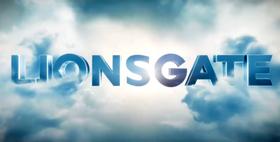
Although there is no sex or profanity, the lack of even a hint of prayer in perilous situations will seem odd to a Christian audience. However, the movie is still entertaining, and a must if you’ve seen the first two.
My Ratings: Moral rating: Average / Moviemaking quality: 3½